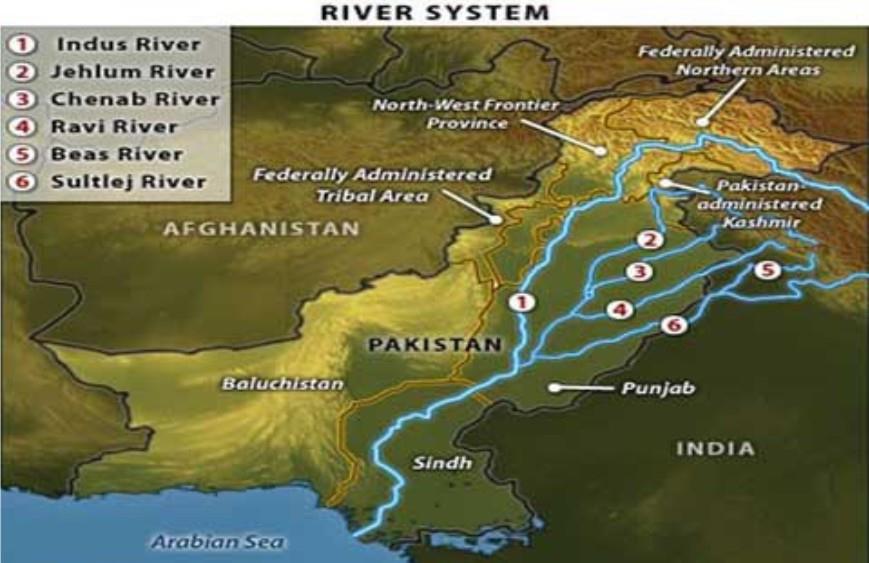
 In the prevailing circumstances, any stern measure can entail serious implications for India in its haste to teach Pakistan a lesson. Rather focus should be on the catastrophic consequences of climate change and impending water crisis facing South Asia as a whole. International community should be convinced by India of the need for regional cooperation involving all countries to meet jointly the challenges rather than confront each other and add to the miseries of the people of the region who are already victims of the vagaries of the climate change and water scarcity.
In the prevailing circumstances, any stern measure can entail serious implications for India in its haste to teach Pakistan a lesson. Rather focus should be on the catastrophic consequences of climate change and impending water crisis facing South Asia as a whole. International community should be convinced by India of the need for regional cooperation involving all countries to meet jointly the challenges rather than confront each other and add to the miseries of the people of the region who are already victims of the vagaries of the climate change and water scarcity.
In the wake of the Pak-sponsored terror attacks, the latest being against the Uri Army base in J&K, Indus Waters Treaty has come under sharp focus with pressure building on the NDA Government led by Prime Minister Narendra Modi to mull over a strict course of action – either by abrogating or reviewing the treaty – to chastise Pakistan.
Indus Waters Treaty (IWT), signed in 1960, is regarded as a landmark pact in the annals of water-sharing agreements between countries the world over, and it is also deemed as the immaculate example of cross-country cooperation in Asia. The provisions of the treaty were earnestly adhered to over the past five decades and survived Indo-Pak wars of 1965 and 1971 and were not really tinkered with even during the 1999 Kargil conflict. India has displayed diplomatic maturity and stoic resilience to Pakistan’s frequent endeavours to internationalise the IWT by taking the matter to the International Court of Arbitration.
The Indus Water Treaty, signed on September 19, 1960 between India and Pakistan, was brokered by the World Bank. Undoubtedly, IWT administers as to how river Indus and its tributaries that flow in both countries will be utilized; nonetheless, also envisages that Beas, Ravi and Sutlej are to be governed by India, while Indus, Chenab and Jhelum are to be taken care by Pakistan. Apart from establishing a Permanent Indus Commission as a bilateral commission to implement and manage the provisions of the treaty and solve disputes arising over water sharing, the treaty also provides arbitration mechanism to resolve disputes amicably.
Abrogating IWT?
Some hardliners have pointed that the IWT should be unilaterally abrogated by India to teach Pakistan a lesson. The IWT is the backbone of Pakistan’s agricultural economy, which constitutes 19.8 percent of that country’s GDP and is the largest employer – 42.3 percent of the country’s total labour force. The three rivers controlled by Pakistan under the Indus Waters Treaty support 90 percent of the country’s agriculture.
One expert has pointed out that Pakistan has regularly backed away from following the provisions under bilateral agreements with India. He further argues that when Islamabad refuses to observe the terms of the 1972 Shimla agreement, it undercuts the IWT and such Pakistan can’t selectively demand India’s compliance with one treaty while it flouts a peace pact serving as the essential basis for all peaceful cooperation.
While pointing out that the IWT is a highly one-sided agreement, which India virtually gifted to Pakistan, another expert opines that because India gave away control over the three rivers to Pakistan, this led to shortage of power generation and lack of industrial development in Jammu and Kashmir, which in other words, has kept the people of J&K frustrated with the Indian government. Moreover, some skeptics point out since China has stealthily built a dam on the Indus river, it also strengthens the reason for abrogation of the IWT. However, this seems to be a far-fetched reason that doesn’t warrant serious attention.
Undoubtedly, some experts have advocated the abrogation of the IWT to reprimand Pakistan; nevertheless, it seems easier said than done because the question arises as to where the water, prevented from flowing into Pakistan go. Certainly, this stalled water would go to J&K and its neighbouring states in the absence of sufficient dams and canals to channelize the flow of excess water. Some experts also point out undoubtedly J&K is a mountainous state which could prevent water from flowing towards the lower plains, but scrapping of the IWT in haste without proper infrastructure in place also entails the risk of recurrence of Uttarakhand like situation in J&K.
The three rivers under Pakistani control cannot be connected to the other rivers because the Pir Panjal Mountains insulated them from the rest of the country. Since Kashmir isn’t an agricultural state, any short terms measure to build infrastructure wouldn’t be of much help. Cutting down the water supply to Pakistan will take a lot of time and effort because India has to build dams on the rivers to store water, which will take time. The dams might also become targets of Pakistan-sponsored terrorism.
In the absence of any adequate infrastructure in place, any decision in haste to stop the waters from flowing into Pakistan could be catastrophic for India in terms of causing floods in Jammu and Kashmir and Punjab. And it could take years if India does mull building infrastructure to bring this water to Punjab. From here, with help of a canal system associated with Bhakra Nangal Project, the water can be channelized into states like Punjab, Haryana and Rajasthan.
Reviewing the IWT
Government of India’s recent decision of reviewing the IWT is seen by many experts as a plausible option that is designed to deliver a jolt to Pakistan. India’s strategy of ignoring Pakistan’s objections to three hydro-electric projects on Indus tributaries and go ahead with them is deemed by some experts a good strategy that constitutes nothing short of a major ‘water offensive’ against Pakistan by India.
If Modi Government ‘walks the talk’ by expediting the work on the Pakal Dul, Bursar and Sawalkot projects, it will certainly put Pakistan on notice. Both the 1,000 MW Pakal Dul hydel project on the Marusadar river, a tributary of the Chenab, and the 1,020 MW Bursar project on the Chenab are likely to raise Pakistani hackles. These two are among the projects that Pakistan has been dead set against.
And the 1,200 MW Sawalkot project, much bigger than these two, will drive the Pakistanis up the wall even more. Pakistan has been saying that the proposed Sawalkot dam falls within the seismic zone of the Himalayas and would be highly vulnerable to earthquakes. Some experts across the border argue that Sawalkot would pose the threat of a huge environmental disaster for Pakistan.
Modi Government’s decision to review the Tulbul navigation project, which India had suspended, is reportedly designed to drive Pakistan into a state of paranoia. Some Pakistani experts have been claiming that this project, apart from depriving Pakistan of water, would pose a serious security risk to it.
Some experts feel that India’s new ‘water offensive’, if carried out to its logical end, will not produce quick results but will wreak unspeakable havoc on Pakistan in the long term. They also opine that India is not kicking off this ‘water offensive’ unilaterally; it’s only responding to a ruthless water war that Pakistan is already waging. According to one opinion, Indian ‘water offensive’ entails two imponderables. One, any dams that Pakistan perceives to be against its interests may become terror targets. Two, China could retaliate by impounding water of the Indus and the Sutlej, which originate in that country, by building dams there. But like the Indian plans, any Chinese threat too would take time to materialize.
Way Forward
Abrogating the IWT is fraught with pernicious implications both for India as well as Pakistan in the wake of ongoing process of global climate change, depletion of the Himalayan glaciers and rainfall shortages in the recent years in that swathes of South Asia, particularly its northwestern part, comprising Pakistan and Afghanistan, which are already bracing for severe water shortages. Add to that pollution of the rivers, staggering quantities of industrial waste, inadequately developed rainwater harvesting system and growing need for rural electrification.
Pakistan faces a grim future of water-starved restiveness and abrogating the Indus Waters Treaty in an already tense situation of state-sponsored terror from that country would only aggravate the problem, not solve it. Besides, neighbouring Afghanistan is equally battling a looming environmental crisis due to soil erosion, increasing ‘salination’ of precious ground water, de-vegetation and conflict-led pollution of natural resources. Thus, entire Afghan-Pak region is in the grip of water-stressed situation.
Even the United Nations is of the opinion that the treaty should not be abrogated. The UN opinion is especially significant because this shows that India’s reputation in the world may be damaged if it abrogates the treaty.
The Expected Trauma
Some experts feel that any Indian attempt to put a squeeze over water flowing to Pakistan suffers from infirmities, especially as there is no way to control the fast flowing waters of the Indus, at least in India. Unless, India builds dams and forces the India-friendly population of Ladakh to undergo the trauma of massive displacement.
Some observers fell that the fears of India vis-à-vis Brahmaputra and Pakistan about the three Western Rivers may be misplaced. This is because bulk of the catchment area of the Brahmaputra falls in India. The same is true for the Indus. Over 70 per cent of its catchment area is in Pakistan and it increases after the Kabul river joins the Indus. To keep Pakistan in perpetual anxiety, several more dams will have to be built. But if Pakistan also readies a few dams on its side, as it is doing with the Neelum-Jhelum project, the excess water released by India will have no impact.
Need for Regional Co-operation
According to one opinion, India has more to fear from China’s tactics than Pakistan with respect to India. This is because the IWT has a large number of in-built confidence and trust building measures, which were the product of a neutral expert and India’s willingness to be generous in sharing the waters. But China has played hard ball with India as well as other countries in parting with data on water flows of common rivers.
In the prevailing circumstances, any stern measure can entail serious implications for India in its haste to teach Pakistan a lesson. Rather focus should be on the catastrophic consequences of climate change and impending water crisis facing South Asia as a whole. International community should be convinced by India of the need for regional cooperation involving all countries to meet jointly the challenges rather than confront each other and add to the miseries of the people of the region who are already victims of the vagaries of the climate change and water scarcity.
Arvind Kumar
October, 2016
This article has been published in October 2016 issue of SME World magazine
http://smeworld.asia/Stories.aspx?Stories=Stories-90/indus-water-treaty-conundrum—india#.WBiRANJ97IU



